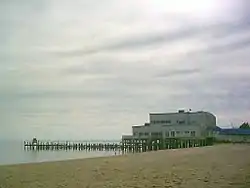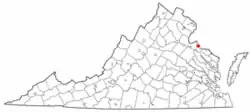Colonial Beach, Virginia | |
|---|---|
 Pier and Riverboat Off Track Betting, Restaurant, and Lounge. | |
 Seal | |
| Nicknames: Golf Cart Town, Playground on the Potomac | |
 Location in the Commonwealth of Virginia | |
| Coordinates: 38°15′N 76°58′W / 38.250°N 76.967°W | |
| Country | |
| State | |
| County | Westmoreland |
| Founded | 1892 |
| Area | |
| • Total | 2.78 sq mi (7.21 km2) |
| • Land | 2.45 sq mi (6.34 km2) |
| • Water | 0.33 sq mi (0.86 km2) |
| Elevation | 10 ft (3 m) |
| Population (2010) | |
| • Total | 3,542 |
| • Estimate (2019)[2] | 3,619 |
| • Density | 1,478.35/sq mi (570.72/km2) |
| Time zone | UTC−5 (EST) |
| • Summer (DST) | UTC−4 (EDT) |
| ZIP code | 22443 |
| Area code | 804 |
| FIPS code | 51-18400[3] |
| GNIS feature ID | 1493549[4] |
| Website | http://www.colonialbeachva.net/ |
Colonial Beach, Virginia (CBVA) is a river and beach town located in the northwestern part of Westmoreland County on Virginia's Northern Neck peninsula. It is bounded by the Potomac River, Monroe Bay and Monroe Creek. It is located 65 mi (105 km) from Washington, D.C.; 70 mi (110 km) from the state capital of Richmond; and 35 nautical miles from the Chesapeake Bay.
Colonial Beach was named Best Virginia Beach for 2018 by USA Today.[5] In 2019, Colonial Beach was named The Nicest Place in Virginia and a finalist for Nicest Places in America by Reader's Digest.[6]
Colonial Beach was a popular resort town in the early to mid-20th century, before the Chesapeake Bay Bridge made ocean beaches on the Eastern Shore of Maryland more accessible to visitors from Washington, D.C. The family of Alexander Graham Bell maintained a summer home in Colonial Beach, the Bell House, which still stands today. Sloan Wilson, author of The Man in the Gray Flannel Suit, retired and died in Colonial Beach. George Washington, the first President of the United States, was born near here at what is now the George Washington Birthplace National Monument. As of 2011, the James Monroe Family Home Site, birthplace of President James Monroe, now has a small monument to him.[7]
History
Judging by excavations done on oyster pits, it would seem that Native Americans have inhabited the area of modern-day Colonial Beach since at least the Early Woodland Period (500 B.C.- A.D. 900).[8]
The town area now known as ‘The Point’ was originally patented by John Lancelott and S. Lancelott [Odyer and Sturman Escheat] on October 29, 1651.[9]
Colonial Beach emerged as a bathing and fishing resort in the late 19th century known as the "Playground on the Potomac." Prior to automobile travel, most visitors arrived by boat from Washington, D.C.[10]
The town was incorporated on February 25, 1892, and there was extensive construction of houses, summer cottages, and hotels. Arguably the most famous of these structures is the Bell House, built for Alexander Graham Bell as a summer home, which still stands today on Irving Avenue.[10]
The area was at the center of the Potomac River Oyster Wars between Virginia watermen and the Maryland State Oyster Police that lasted from the late 19th century to the 1960s.[11]
The town began to gradually decline as the automobile made travel to more distant ocean beaches more feasible. However, because gambling was legal in Maryland and the Maryland state line ends at the low-water mark of Virginia's Potomac River shore, from 1949[12] to 1958,[13] Colonial Beach offered slot machines in pier casinos extending into Maryland waters. This temporarily revitalized the town, although it was sometimes called "the poor man's Las Vegas."[11] However, the piers burned in the 1960s in a devastating fire and the town continued to decline.[10]

The town is ranked fifth-safest place to live in Virginia by Safewise.
Geography
Colonial Beach is located at 38°15′14″N 76°58′8″W / 38.25389°N 76.96889°W (38.253840, −76.968941),[14] in the northwestern part of Westmoreland County in Virginia's Northern Neck, 65 mi (105 km) from Washington, D.C., and 70 mi (110 km) from the state capital Richmond.
The Potomac River forms the northeast boundary of Colonial Beach. The southern part of the town forms a peninsula which ends just above Monroe Bay and divides Monroe Creek from the Potomac River. A short distance north of Colonial Beach is the community of Potomac Beach and the mouth of Rosier Creek. Inland from Colonial Beach lie the settlements of Monroe Hall, near the birthplace of President James Monroe, and Maple Grove.
.jpg.webp)
According to the United States Census Bureau, the town has a total area of 2.8 square miles (7.3 km2), of which, 2.6 square miles (6.7 km2) of it is land and 0.2 square miles (0.52 km2) of it (8.80%) is water. The town's 2.5 miles (4.0 km) of beaches are second in length only to those of Virginia Beach in the Commonwealth of Virginia.
Climate
The climate in this area is characterized by hot, humid summers and generally mild to cool winters. According to the Köppen Climate Classification system, Colonial Beach has a humid subtropical climate, abbreviated "Cfa" on climate maps.[15]
Demographics
| Census | Pop. | Note | %± |
|---|---|---|---|
| 1900 | 453 | — | |
| 1910 | 721 | 59.2% | |
| 1920 | 1,093 | 51.6% | |
| 1930 | 928 | −15.1% | |
| 1940 | 1,105 | 19.1% | |
| 1950 | 1,464 | 32.5% | |
| 1960 | 1,769 | 20.8% | |
| 1970 | 2,058 | 16.3% | |
| 1980 | 2,474 | 20.2% | |
| 1990 | 3,132 | 26.6% | |
| 2000 | 3,228 | 3.1% | |
| 2010 | 3,542 | 9.7% | |
| 2019 (est.) | 3,619 | [2] | 2.2% |
| U.S. Decennial Census[16] | |||
As of the census[3] of 2000, there were 3,228 people, 1,437 households, and 863 families residing in the town. The population density was 1,246.7/sq mi (481.4/km2). There were 2,030 housing units at an average density of 784.0/sq mi (302.7/km2). The racial makeup of the town was 79.21% White, 16.95% African American, 0.09% Native American, 0.62% Asian, 1.64% from other races, and 1.49% from two or more races. Hispanic or Latino of any race were 3.38% of the population. The population was 3,542 at the 2010 census.
There were 1,437 households, out of which 24.1% had children under the age of 18 living with them, 40.9% were married couples living together, 15.3% had a female householder with no husband present, and 39.9% were non-families. 34.9% of all households were made up of individuals, and 18.2% had someone living alone who was 65 years of age or older. The average household size was 2.20 and the average family size was 2.77.

In the town, the population was spread out, with 22.0% under the age of 18, 6.3% from 18 to 24, 23.2% from 25 to 44, 26.0% from 45 to 64, and 22.5% who were 65 years of age or older. The median age was 44 years. For every 100 females, there were 82.7 males. For every 100 females age 18 and over, there were 77.6 males.
The median income for a household in the town was $31,711, and the median income for a family was $38,080. Males had a median income of $30,000 versus $19,535 for females. The per capita income for the town was $19,991.20 About 23.0% of families and 25.4% of the population were below the poverty line, including 45.7% of those under age 18 and 16.6% of those age 65 or over.
Infrastructure
Transportation
Colonial Beach is served by Virginia State Route 205, a spur of which bisects the town as State Route 205Y (Colonial Avenue). The town is accessible by boat and is the last deepwater port for pleasure boats going north on the Potomac River.[17]
Notable people
- Ed Mirvish – Canadian businessman and philanthropist.
- Sloan Wilson – author of The Man in the Gray Flannel Suit.
- Torrey Smith – Two-time Super Bowl winning NFL player.
- Sherryl Woods – Author of the Chesapeake Shore Series of novels and Producer of Chesapeake Shores Television show [18]
- Krystal Ball – Political pundit and journalist for The Hill
References
- ↑ "2019 U.S. Gazetteer Files". United States Census Bureau. Retrieved August 7, 2020.
- 1 2 "Population and Housing Unit Estimates". United States Census Bureau. May 24, 2020. Retrieved May 27, 2020.
- 1 2 "U.S. Census website". United States Census Bureau. Retrieved January 31, 2008.
- ↑ "US Board on Geographic Names". United States Geological Survey. October 25, 2007. Retrieved January 31, 2008.
- ↑ "Best Virginia Beach Winners: 2018 10Best Readers' Choice Travel Awards". 10Best. Retrieved June 19, 2018.
- ↑ Self-Sullivan, Caryn; Price, Katrina. "The Nicest Place in Virginia: Colonial Beach". Reader's Digest. Retrieved July 2, 2019.
- ↑ Leggitt, Richard, "Blues Fest" Brings Thousands to the Beach," The Westmoreland Journal, June 26, 2013
- ↑ "Archaeological Data Recovery at the Gouldman Oyster Shell Midden Site (44WM0304) in Westmoreland County, Virginia" (PDF).
- ↑ David Wolfe Eaton. "Historical Atlas of Westmoreland County, Virginia" The Dietz Press, Richmond Virginia, 1942. Pages 46, 62
- 1 2 3 Town of Colonial Beach: History Archived May 14, 2008, at the Wayback Machine at the official town website. Retrieved November 5, 2008.
- 1 2 William J. Burnham, Mary K. Burnham, Bill Burnham. Rediscovering America: Exploring the Small Towns of Virginia and Maryland. Hunter Publishing, 2003. p. 136. ISBN 978-1-58843-319-0
- ↑ "Slots on Piers Evade Law In Virginia." The Washington Post. July 23, 1949.
- ↑ "Supreme Court Refuses to Review Maryland Ban on Potomac Casinos." The Washington Post. February 25, 1959.
- ↑ "US Gazetteer files: 2010, 2000, and 1990". United States Census Bureau. February 12, 2011. Retrieved April 23, 2011.
- ↑ Climate Summary for Colonial Beach, Virginia
- ↑ "Census of Population and Housing". Census.gov. Retrieved June 4, 2015.
- ↑ William J. Burnham, Mary K. Burnham, Bill Burnham. Rediscovering America: Exploring the Small Towns of Virginia and Maryland. Hunter Publishing, 2003. p. 137. ISBN 978-1-58843-319-0
- ↑ "Sherryl Woods - the Sweet Magnolias". Archived from the original on April 9, 2018. Retrieved April 9, 2018.
